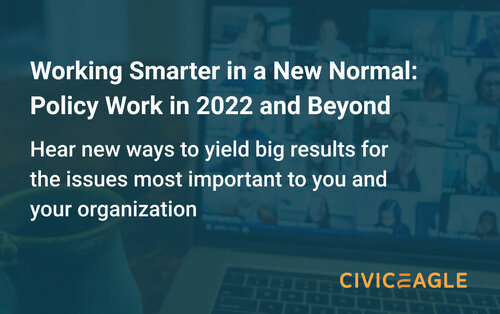Policy work has changed by leaps and bounds over the last two years, as a result of digital transformations spurred by the pandemic. Political pros have had to quickly adapt to a new remote-only environment to stay on top of their political game. It’s a sharp departure from a world that depends on attending hearings and meeting with legislators, staffers, and activists face-to-face.
With continued uncertainty and new variants of COVID-19 spreading rapidly, teams that are successfully using more digital tools for efficiency and collaboration will be better positioned to influence and win legislative battles in 2022.
The Adjustment
If you work in policy, then you saw first-hand many of the bumps in the road as legislative bodies adjusted to virtual work. Not only did you have to get your teams set up to work from home, you also had to figure out ways to keep the pressure on lawmakers when you could no longer go to the statehouse.
Everything needed to be moved online — gone were the days of passing notes during hearings, stopping by offices, or counting votes on a whiteboard in the office. Knowledge needed to be shared, and situational updates on legislation needed to be stored in an accessible space.
“And then when the pandemic hit, we all went into our homes and had to figure out ways to interact with staff and members, and it was a daunting task at first, logistically, just to figure out where people were and the best way to get in contact with them… so that was a really huge mountain to climb in the beginning.”
— Orlando Jones, Secure Elections Project
As lawmakers adapted to virtual hearings, we also saw the volume of work increase. Legislation often moved faster, and policy teams that didn’t have efficient virtual teams and systems could easily fall behind.
In the year and a half since the pandemic began, we’ve learned a lot about how to manage workflow in this new, emerging environment. So what can you do now to prepare for your next legislative session — whether it’s virtual or not?
Digital Tools Are No Longer A “Nice To Have”
The transition to remote work made it immediately clear that digital collaboration tools are a necessity, not just an “extra.” This was only made more important by the observation that legislation moved faster than ever, with lawmakers jamming more and more hearings into the calendar.
This faster pace will continue in 2022 and beyond. And there are a few key areas where well-designed digital tools can provide a necessary boost:
- Legislative intelligence
AI tools that identify important legislation and monitor it as it moves through committee can save hours a day over manually tracking moving legislation. Discussions and assignments can even happen directly in tracking tools - Contact tracking
As policy staff interact with lawmakers, staff, and activists over a variety of mediums, having all of that information in one, accessible place is crucial. - Coalition work
With multiple organizations working on similar issues, or supporting or opposing the same bills, it’s never been more vital to ensure everyone is on the same page.
Before the pandemic, many organizations were using ad-hoc solutions to track the large amount of information that now needed to be shared virtually. Data lived in spreadsheets, scattered documents, email messages, texts, and chats.
Now, more than 16 months in, organizations are taking a critical look at how they work, to ensure a deliberate approach that fosters efficiency and effective collaboration.
The “New Normal” Is Here To Stay
With 2022 sessions looming around the corner, there’s little doubt that the pace of legislative work will only continue to quicken. For anyone working to influence legislation, keeping up with an ever growing workload will require new levels of efficiency.
At the same time, many facets of the pandemic environment, such as more virtual hearings, will continue. While this allows participation from any location — it also increases the likelihood of staff burnout. Utilizing tools that allow for real-time, secure sharing of notes and resources is vital not only for efficiency but to allow smooth handoff of work between staff.
Hear from The Pros
Want to know more about how teams have successfully leveraged remote work? Watch our webinar featuring speakers working on two hot button issues — voting rights and clean energy.

